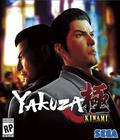Genre: Action
Developer: Sega
Publisher: Sega
Release Date: September 5, 2006
Since its unveiling, Sega’s Yakuza (Ryuu Ga Gotoku in Japan) has made a lot of impressions on people. The scope of the city where the game takes place has given it a Grand Theft Auto motif. The given backstory made it appear mysterious and deep. Finally, the news that Sega was going to take the better part of a year to have the whole thing dubbed in English gave many video game fans heart attacks.
Well, the secrets are just about out, folks. First off, reports of Yakuza being the Japanese answer to Grand Theft Auto are greatly exaggerated. While Tokyo is well-rendered, spacious, and contains an on-screen navigable map, the whole sense of “sandbox” just isn’t quite there. (If you’re reading this article, no doubt you’ve heard every game journalist in the world spout out half-baked witticism after half-baked witticism regarding this revelation. To which we at WorthPlaying say, “all right, all right, we get it, already. Sheesh.”) There are, however, interconnecting missions that will have you traveling the city.
Yakuza’s story is still somewhat deep and mysterious, but the nature of the gameplay (discussed below) makes it more straightforward than one expects. Finally, the decent, professionally-hired English dub didn’t instantly turn the game into a trainwreck. All but the most diehard subtitle elitists can breathe a sigh of relief.
So, if Yakuza can’t be shoehorned into the GTA genre, then what is is like? How can you describe it? Well, I’ll give it a shot.
Yakuza is more like the spiritual successor to Shenmue… or rather, the brash, rougher twin brother of Shenmue that we never got to know until now. See, Yakuza is mainly for people who loved the concept of Shenmue, but hated the fact that it kept you on a strict time clock and was sometimes prone to make you pointlessly move boxes for a living. In Yakuza, you get all of Shenmue’s drama (plus a whole lot of maturity slapped on top—the F-bombs are everywhere). You also get Shenmue’s incredible graphics standard. Remember how that game looked on the Dreamcast compared to other games? Yakuza’s the same way. Highly-rendered throngs of people walk equally-pretty renderings of Tokyo’s streets without any framerate loss whatsoever. It gives the appearance of a living, sprawling city, arguably better than any PS2 title has to date. It’s amazing that the PS2, the weakest of the current-generation systems, is pumping this out.
However, in a sharp contrast from Shenmue, Yakuza steers the concept less towards exploration and more towards fighting. These fights put more emphasis on flash and fun, and less on technicality. They’re expressly coded to give you a feeling and sense of being, well, an ultimate badass. Every hit rings in your ears, and the last hit of every fight is given a thunderous slow-motion finishing flash. He can use objects in the area to accomplish his objective, and throw objects, both animate and inanimate.
Kiryu also has access to special techniques known as “Heat Attacks.” These are extra-brutal attacks done in the midst of fights that cause Kiryu to dispatch his enemies using anything that’s close by—a wall, a chair, file cabinet, anything. As Kiryu further fights, he can level himself up via an experience distribution system vaguely similar to God of War. This gives him access to new techniques, combos, and increased endurance.
Given the story, all of this fighting is slightly ironic. You play as Kiryu Kazama, once a rising mob star, in the middle of forming his own family, who is set up into taking the fall for a murder and serving a ten-year sentence. Once he gets out, he tries to go straight, but a mysterious girl and a cache of cash pull him back into a life he wants no more part of. What follows is a tale of betrayal, mystery and revenge that will pit Kiryu in fistcuffs against obvious enemies, and those he used to call friends. He must now unravel the secrets of the organization he used to be a part of, and make it out alive.
There’s only one way to see for yourself whether or not Kiryu will find peace, and that’s to be there for every bone-crunching minute when the game ships at the beginning of September. No matter what its outcome, Yakuza promises to be a wild ride.
More articles about Yakuza Kiwami













 Yakuza Kiwami is a thrilling action-adventure game that takes players deep into the world of Japan's infamous underground organization.
Yakuza Kiwami is a thrilling action-adventure game that takes players deep into the world of Japan's infamous underground organization.





























